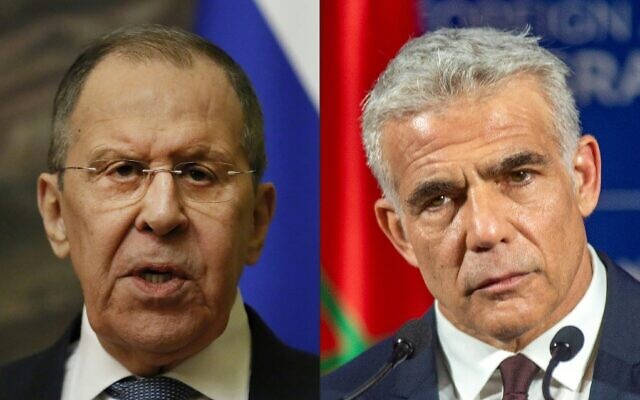In a phone call Thursday, Russian President Vladimir Putin apologized to Prime Minister Naftali Bennett for incendiary comments made by the Kremlin’s top envoy earlier this week, the prime minister’s office said.
The comments by Russian Foreign Minister Sergey Lavrov claiming that Adolf Hitler had “Jewish blood,” and the following back-and-forth between Israel and Russia, marked the worst flare-up between the countries since Russia invaded Ukraine.
“The prime minister accepted the apology of President Putin for comments by Lavrov and thanked him for clarifying the president’s view of the Jewish people and the memory of the Holocaust,” Bennett’s office said.
The Kremlin said Putin spoke with Bennett about “historic memory,” the Holocaust and the situation in Ukraine, without mentioning an apology.
Bennett also requested Putin “examine humanitarian options” for evacuating the Ukrainian city of Mariupol. “The request came following Bennett’s conversation with the president of Ukraine, Volodymyr Zelensky, yesterday,” Bennett’s office said.
Putin said Russian forces will allow the evacuation of civilians, the prime minister’s office said.
Earlier Thursday, Putin sent a message to President Isaac Herzog to “congratulate” him on Israel’s Independence Day.
“I am confident that Russian-Israeli relations based on the principles of friendship and mutual respect will continue to develop for the benefit of our peoples and in favor of strengthening peace and security in the Middle East,” Putin said, according to Herzog’s office.
In their call, Bennett thanked Putin for his Independence Day good wishes.
Channel 12 reported that Bennett had called Putin, and the Russian leader initiated the apology.
Ties between Israel and Russia soured following a claim by Russian Foreign Minister Sergey Lavrov that Adolf Hitler had Jewish heritage, in an attempt to explain Moscow’s attempts to “de-Nazify” Ukraine, whose president, Volodymyr Zelensky, is Jewish.
Israel — along with many Western nations — harshly criticized Lavrov for comments made on Sunday claiming that “Hitler also had Jewish blood” and that “some of the worst antisemites are Jews.”
Lavrov made the remarks in an interview with an Italian news outlet while attempting to justify the oft-repeated Russian talking point that it invaded Ukraine in an effort to “de-Nazify” a country led by a Jewish president.
Russian Ambassador to Israel Anatoly Viktorov was summoned to the Foreign Ministry on Monday for a discussion on the comments, which Foreign Minister Yair Lapid called “unforgivable.”
Russia’s Foreign Ministry then doubled down on the claims Tuesday in a statement that accused Lapid of making “anti-historical statements” that “largely explain why the current Israeli government supports the neo-Nazi regime in Kyiv.”

Russian Foreign Minister Sergey Lavrov (left) attends a press conference in Moscow on April 27, 2022, and Foreign Minister Yair Lapid addresses a press conference in Casablanca, on August 12, 2021. (Yuri Kochetkov/Various sources/AFP)
Lapid said Tuesday morning that the Russian government should apologize to Jews and to Holocaust victims for Lavrov’s comments.
In an interview with the Kan public broadcaster, Lapid said he could not “rule out” the possibility that Lavrov’s comments were made in response to Lapid’s own statements accusing Russia of war crimes amid its ongoing invasion of Ukraine.
Bennett spoke with Zelensky on Wednesday about Lavrov’s comments.
Zelensky said the two leaders had discussed the “scandalous and completely unacceptable remarks” by Lavrov, according to Reuters.
Bennett has avoided criticizing Russia directly as Israel seeks to maintain its freedom of movement in the skies of neighboring Syria, which are dominated by Russian forces.
Jerusalem and Moscow have in recent years maintained a so-called deconfliction mechanism that works to prevent Israeli and Russian forces from clashing in Syria. Russia is a main player backing the Syrian government in a grinding civil war, while Israel has waged a years-long campaign of airstrikes aimed at pro-Iranian fighters located there and at preventing the transfer of Iranian-supplied weaponry.
Early on in Russia’s invasion of Ukraine, launched at the end of February, Israel sought to walk a diplomatic tightrope between Moscow and Kyiv, preserving relations with both of its allies and offering to broker talks, while supplying Ukraine with humanitarian assistance.
But more recently, Jerusalem has turned toward supporting Ukraine, denouncing Russia for committing apparent war crimes and sending helmets and flak jackets to Ukraine, reversing an earlier policy of not supplying military aid.
Reports this week indicated that officials were set to discuss Israeli aid to Ukraine, including supplies of defensive military equipment so far withheld by Jerusalem.
Moscow has repeatedly sought to justify its invasion of Ukraine by claiming that it is working to counter neo-Nazi forces in the country, something largely dismissed by most Western nations.
Also Thursday, Lapid spoke with Ukrainian Foreign Minister Dmytro Kuleba.
Kuleba congratulated Lapid on Israel’s 74th Independence Day, and Lapid said Israel was “a true friend of Ukraine,” citing humanitarian aid to the war-torn country, and promising to assist post-war reconstruction.
Kuleba thanked Lapid for Israel’s support, including for Israel’s field hospital in Ukraine, which closed last week after treating over 6,000 patients.
AFP contributed to this report.
